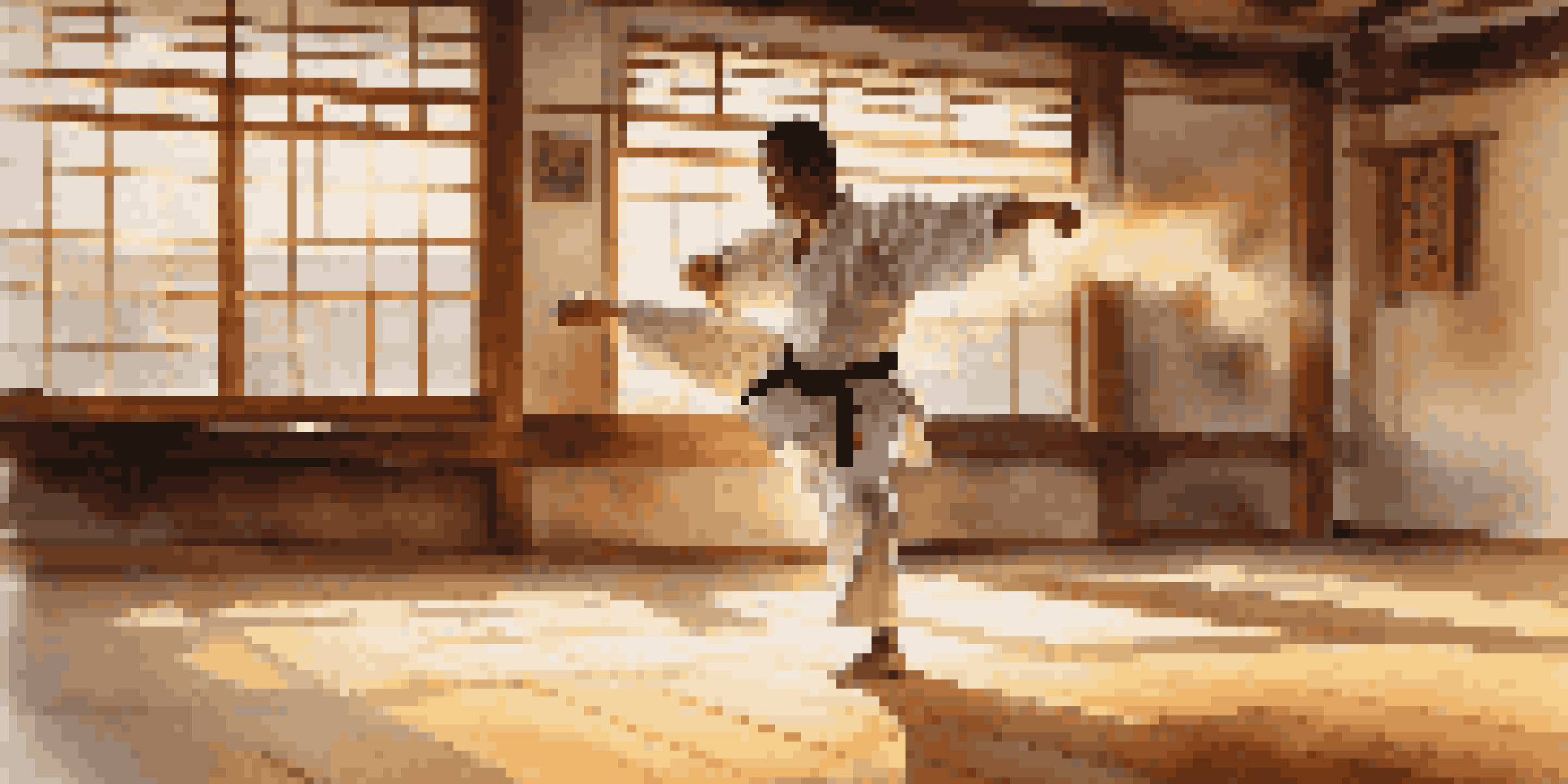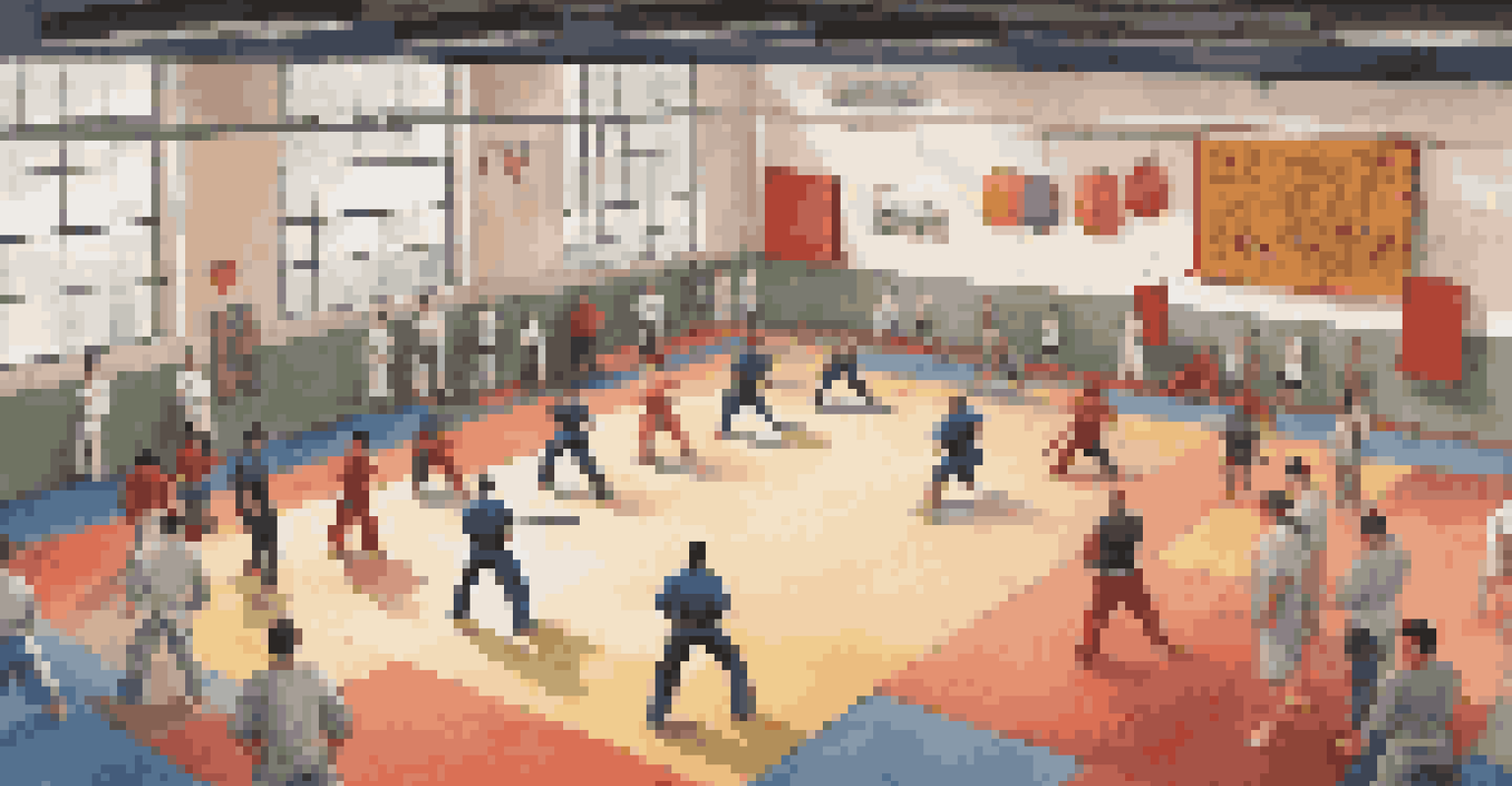Building Endurance Through Martial Arts Training

Understanding Endurance in Martial Arts Training
Endurance is often defined as the ability to sustain prolonged physical or mental effort. In martial arts, this means being able to perform techniques effectively over extended periods, whether during sparring or rigorous drills. Building endurance is crucial, as it not only enhances performance but also boosts confidence in one’s abilities.
Endurance is not just the ability to bear a hard thing, but to turn it into glory.
Martial arts training combines various elements such as strength, flexibility, and cardiovascular fitness, all of which contribute to overall endurance. When practitioners engage in this type of training, they push their limits and improve their stamina gradually. This journey often leads to noticeable improvements in both physical capabilities and mental resilience.
By understanding and focusing on endurance, martial artists can tailor their training to meet specific needs, whether it’s preparing for a competition or simply enhancing personal fitness levels. This holistic approach ensures that they develop the stamina required for success in their martial arts journey.
Cardiovascular Conditioning for Martial Artists
One of the cornerstones of building endurance is cardiovascular conditioning, which is essential for any martial artist. Engaging in activities like running, cycling, or skipping rope can significantly enhance cardiovascular health. A strong heart and lungs enable practitioners to perform techniques more efficiently, especially during high-intensity training sessions.

Incorporating interval training, where short bursts of intense activity are alternated with rest or lower-intensity exercises, can be particularly beneficial. This method mimics the stop-and-go nature of martial arts, allowing practitioners to build both speed and endurance. For example, doing sprints followed by rest periods can help improve both aerobic and anaerobic capacity.
Endurance Is Key in Martial Arts
Building endurance through physical and mental training enhances performance and confidence in martial artists.
Ultimately, better cardiovascular conditioning translates to improved performance in martial arts. As practitioners build their stamina, they may find themselves able to train longer and harder, achieving greater success in their martial arts endeavors.
Strength Training's Role in Endurance
While cardio is vital, strength training plays a crucial role in developing endurance for martial artists. Building muscular strength not only supports better technique but also enhances overall stamina. As muscles grow stronger, they can perform repetitive movements without fatigue, which is essential during long training sessions or matches.
The difference between a successful person and others is not a lack of strength, not a lack of knowledge, but rather a lack in will.
Incorporating exercises that target all major muscle groups can help martial artists develop the strength needed for explosive movements. For instance, squats and deadlifts build leg strength, which is critical for stability and power in kicks. Likewise, upper body strength can enhance punches and grappling techniques.
By integrating strength training into their routines, martial artists can improve their endurance and resilience. This multifaceted approach ensures that they are not only fit but also capable of executing techniques efficiently, even as fatigue sets in.
Flexibility Training Enhances Endurance
Flexibility is often overlooked in discussions about endurance, but it plays a significant role in martial arts. Increased flexibility allows for a greater range of motion in techniques, which can lead to more effective and efficient movements. Stretching regularly helps prevent injuries, allowing practitioners to train consistently without setbacks.
Incorporating dynamic stretching before training sessions warms up the muscles and prepares them for action, while static stretching post-training helps in recovery. This balance not only improves flexibility but also promotes better blood flow, which aids in muscle endurance. For example, improved hip flexibility can enhance kicking techniques and reduce the risk of strain.
Nutrition Fuels Endurance Training
A balanced diet rich in nutrients is essential for maintaining energy levels and optimizing recovery in martial arts.
Martial artists who prioritize flexibility in their training routines often experience less muscle fatigue and soreness. By emphasizing flexibility, they can sustain their performance levels longer and maintain a higher quality of movement, ultimately contributing to their endurance.
Mental Resilience and Endurance in Martial Arts
Endurance isn’t just a physical challenge; it’s also a mental one. Martial arts training requires a strong mindset to push through the discomfort and fatigue that comes with intense workouts. Building mental resilience is crucial for enduring long training sessions, competitions, or challenging sparring matches.
Techniques such as visualization and mindfulness can help martial artists develop a stronger mental game. For instance, visualizing successful performances can boost confidence and focus, while mindfulness practices can help manage stress and maintain composure during high-pressure situations. This mental training complements physical endurance, creating a well-rounded martial artist.
By cultivating mental resilience, practitioners can learn to embrace discomfort and fatigue as part of their journey. This mindset shift not only improves endurance but also enhances overall performance, allowing martial artists to thrive even when faced with challenges.
Nutrition's Impact on Endurance Training
Proper nutrition is a fundamental aspect of building endurance, as it fuels the body for training and recovery. Consuming a balanced diet rich in carbohydrates, proteins, and healthy fats provides the energy needed for intense workouts. For martial artists, this means fueling up before training sessions to maintain stamina and performance levels.
Incorporating nutrient-dense foods such as whole grains, lean proteins, and plenty of fruits and vegetables can significantly impact endurance. Hydration is equally essential; staying well-hydrated helps maintain energy levels and prevents fatigue during training. For instance, electrolytes lost through sweat can be replenished with sports drinks or coconut water.
Rest and Recovery Are Crucial
Incorporating rest and active recovery into training routines is vital for preventing burnout and promoting endurance development.
By prioritizing nutrition, martial artists can optimize their endurance levels and enhance recovery. A well-fueled body can train harder and longer, ultimately leading to improved performance in their martial arts practice.
The Importance of Rest and Recovery
Rest and recovery are often underestimated when it comes to building endurance, but they are just as crucial as training itself. Overtraining can lead to fatigue and burnout, which hinders progress and increases the risk of injury. Incorporating rest days into a training routine allows the body to repair and strengthen itself, which is essential for endurance development.
Sleep is a vital component of recovery; it’s during this time that the body heals and regenerates. Practitioners should aim for quality sleep each night to support their training goals. In addition, active recovery techniques such as light stretching or yoga can promote blood flow and help alleviate muscle soreness.

By prioritizing rest and recovery, martial artists can sustain their training intensity and improve their endurance over time. This balance between training and recovery ensures that they remain healthy and ready to tackle their next challenge.
Tracking Progress and Staying Motivated
Tracking progress is an essential part of building endurance through martial arts training. Keeping a training journal or using apps can help practitioners monitor their workouts, noting improvements in stamina, strength, and flexibility. This not only provides motivation but also helps identify areas that need more focus.
Setting achievable goals is another effective way to stay motivated on the endurance journey. Whether it’s aiming to complete a certain number of rounds in sparring or improving recovery times, having clear targets can drive progress. Celebrating small victories along the way can make the training process more enjoyable and rewarding.
Ultimately, staying motivated and tracking progress creates a positive feedback loop. As martial artists see improvements in their endurance, they’re more likely to stay committed to their training, continually pushing themselves to reach new heights.